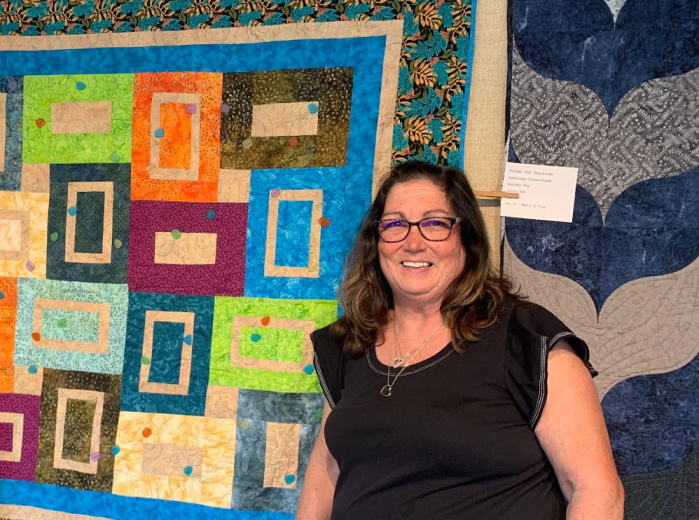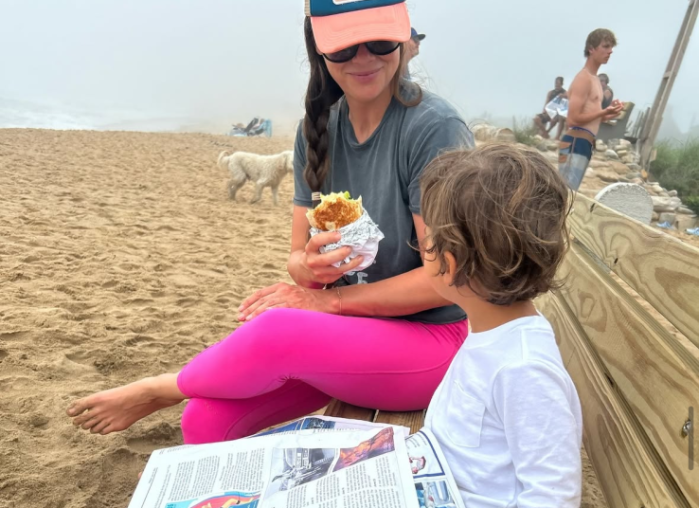
Despite the tides of modern times, Port Washington’s very own literary dolphin has managed to ride the waves of change. The Dolphin Bookshop and Café, founded in 1946, began as a small bookstore by the train station. After more than 20 years on Port Washington Boulevard, Dolphin nearly doubled its square footage, moving in 2010 to the corner of Main Street and Shore Road—the nexus of two of Port’s busiest roads. In just under a decade, Dolphin has transformed itself into a community hub on the waterfront.
“How do we manage?” asked owner Judith Mitzner. “Mostly, just barely, but where there’s a will, there’s a way.”
Alongside carefully handpicked titles for all ages sit an array of gifts and toys. The treat-filled café features free music performances every Friday evening. Dolphin hosts not only author visits, book clubs and poetry readings, but also birthday parties, bridal showers and a different local artist’s work each month, along with PTA meetings and tarot card readings.
A psychic medium is “becoming a bit of a fixture here, too,” Mitzner said.
This just might be what it takes for an independent bookstore to survive in 2019.
“In this day and age, part of being a bookstore is being a piece of the community on multiple levels,” Mitzner said. “People have to want to keep you in business because, obviously, there are other ways of getting books.”
Throughout the 1990s, recounts The New York Times, Barnes & Noble “slashed book prices to lows that its competitors could not match and helped put struggling independent booksellers out of business across the United States.” But in the wake of Amazon, this strategy has proved less successful. Following recent struggles to turn a profit, the country’s largest bookstore chain announced in June that it would be acquired by the hedge fund Elliott Management for about $683 million.

By contrast, Mitzner notes that “independent bookstores are on the rise,” though “not on Long Island,” she added. E-books, though initially lauded for their portability and accessibility, are declining in popularity. According to the Association of American Publishers, sales of digital books fell by 3.6 percent in 2018, whereas paperback scales increased by 1.1 percent and hardback sales 6.9 percent.
“The luxury of a comfortable chair and the physical act of turning the pages of a book cannot be replicated digitally,” said local author Patricia Ryan Lampl. “It is hard for me to imagine a world where a bookstore is a digital kiosk. The publishing world is clearly heading in that direction.”
Katrina Wasserman, an undergraduate at the New School, who fondly recalls attending Dolphin’s books signings as a child, predicts that printed books will become less available—but “not obsolete”—because they’re “not nearly as sustainable” as digitized ones.
Mitzner believes that printed books will continue to exist in the future because of readers’ affinity for their physicality. Maria Kogan, an undergraduate at Columbia University who grew up in Port, agreed, adding that for her, Dolphin is “more than a bookstore.”
“It’s really special to visit Dolphin,” she said, “and always run into other students and families.”
Similarly, Town of North Hempstead Supervisor Judi Bosworth commended Dolphin for being “community-minded.”
“When I need to send a baby gift, I go to Dolphin,” she said. “They help me put together a basket of treasures.”
Perhaps it is this personal touch, which Dolphin also provides to customers looking for new reads, that corporate and online booksellers are lacking.
“We walk around the store with each customer,” Manager Robin Appel said.
Appel attributed Dolphin’s success to its unique selection process, which Mitzner characterized as a “trial-and-error type thing.”
“We have some great books, which are not necessarily on The New York Times Best-Seller list,” Appel said. “We get books that we know would sell to our customers.”

For example, though romance novels often appear on the Best Seller List, Mitzner observes that customers don’t seem to buy them, preferring “literary fiction” instead.
Political nonfiction has also become more marketable at Dolphin, Appel said, noting that readers are increasingly “interested in getting to the bottom of things.”
Mitzner added that Dolphin’s frequent buyer program lets customers accumulate points that translate to coupons for future purchases. Many customers, she finds, are urbanites who move to Port to raise their children.
“There’s a sigh of relief when they enter our store,” she said, “because it reminds them of things that they can see in the city.”
And in the past couple years, Appel has noticed a “whole generation of young moms” seeking to instill a love of reading in their children.
“We’re counting on those people to be plentiful,” Mitzner said somberly.
Yet she hopes for—and expects—a “resurgence of local interest.” She pointed to the many empty stores that dot Main Street, where high rent is often an insurmountable struggle.
“As more and more stores close, people are going to say, ‘Oh my gosh. Our town is dying,’” she said. “Part of the beauty of this place is the character that Main Street provides.”
Lampl echoed Mitzner’s sentiments, arguing that Dolphin “embodies the sense of community that makes Port Washington an enviable place to live.”
Bosworth stressed the importance of shopping locally.
“I can’t think of a better business to support than Dolphin,” she said.
Visit The Dolphin Bookshop and Café at 299 Main St., Port Washington.



























